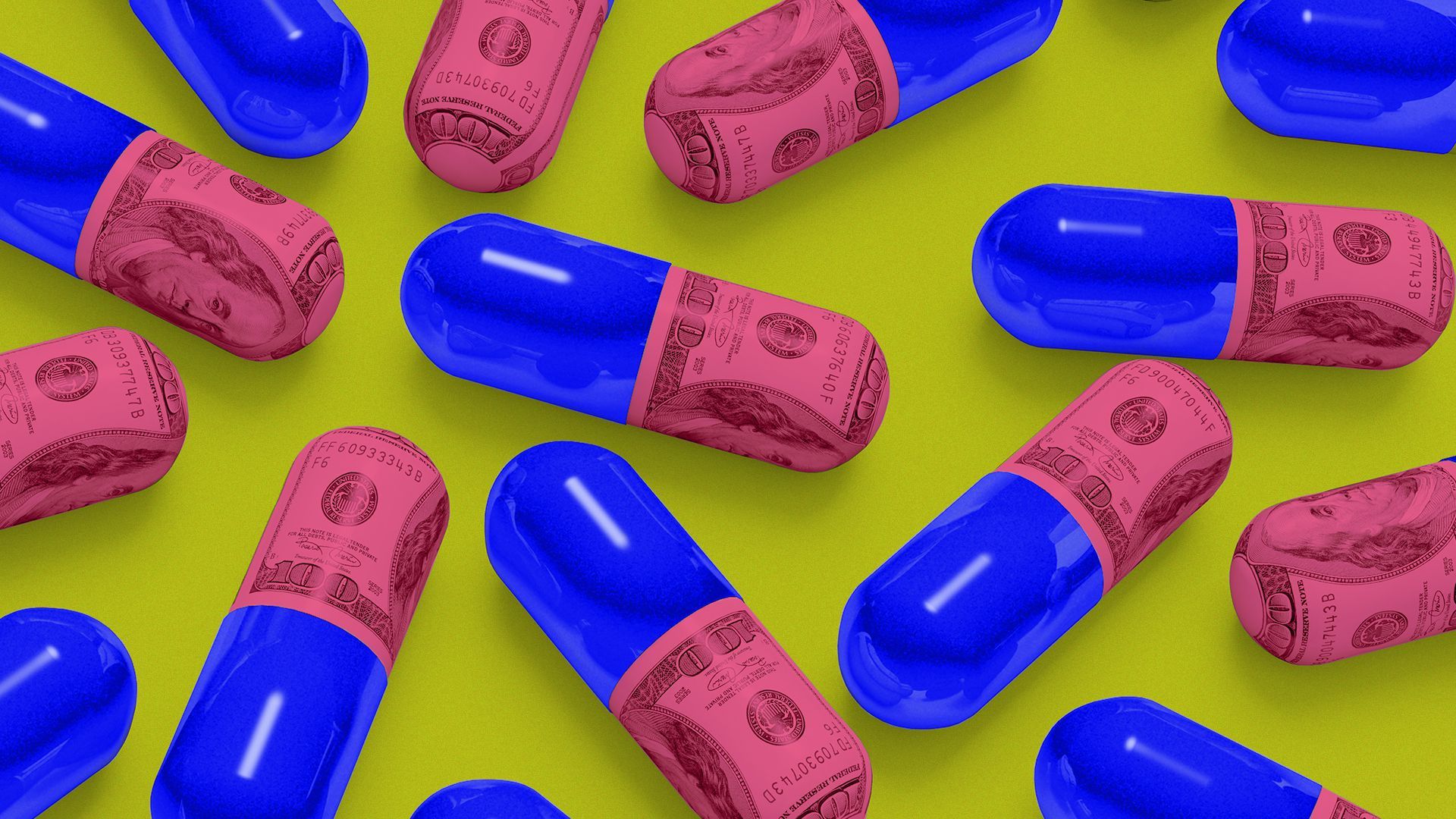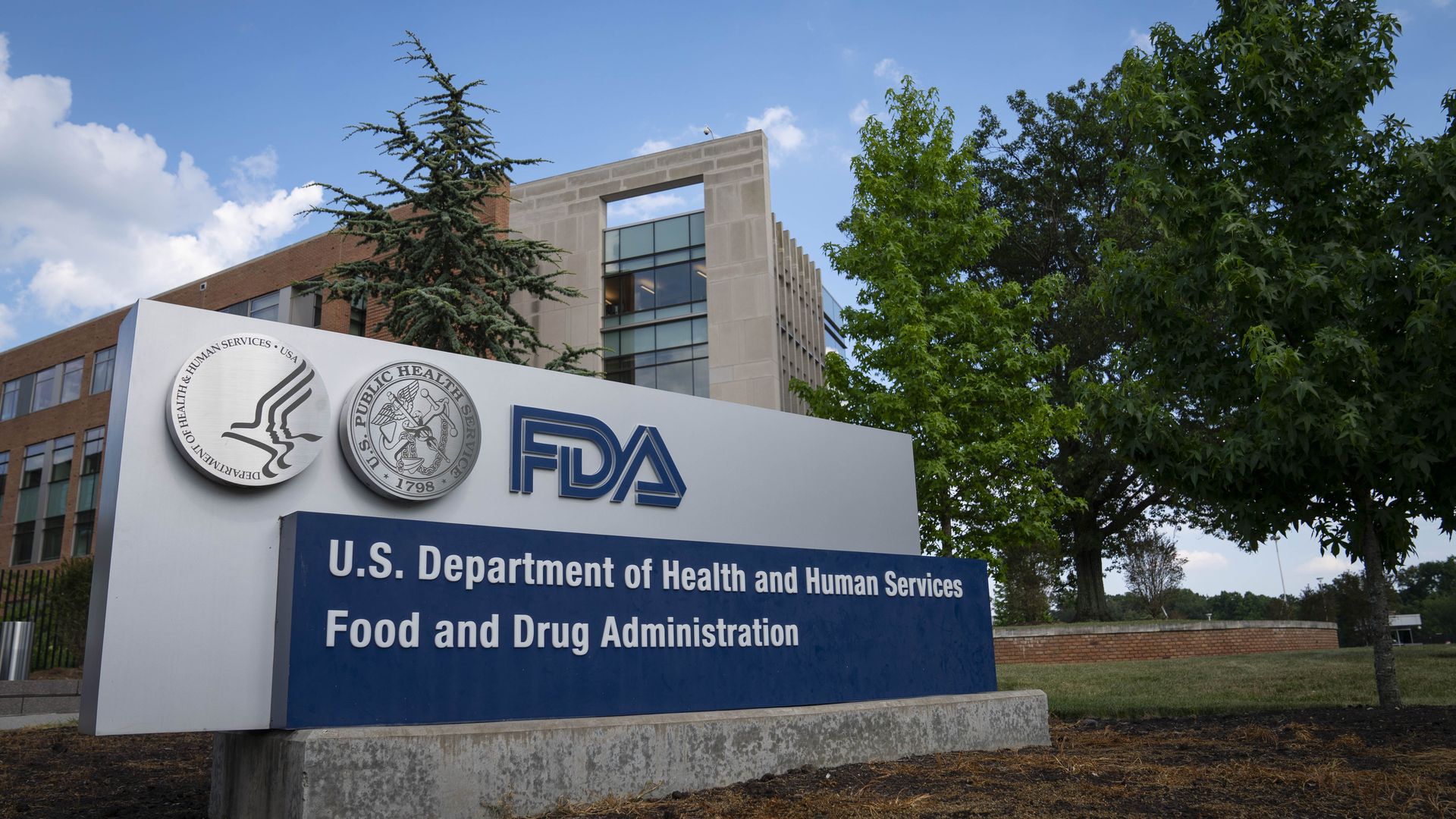| |
| |
| |
| Presented By UnitedHealth Group |
| |
| Axios Vitals |
| By Tina Reed ·Oct 05, 2021 |
| Good morning, Vitals readers. Today's newsletter is 984 words or a 4-minute newsletter. 💉 Situational awareness: NIH director Francis Collins, 71, will announce his resignation today after three decades at the agency, including 12 years at the helm, the geneticist confirmed to the Washington Post. |
| |
| |
| 1 big thing: Taxpayers funded antiviral pill |
 |
|
| Illustration: Rae Cook/Axios |
| |
| The antiviral pill that showed promising results against severe COVID-19 was originally developed at Emory University with $35 million of taxpayer grants, Axios' Bob Herman writes. Why it matters: The federal government consequently owns rights to some of the molnupiravir's patents, which could factor into future purchasing agreements with Merck, which sells the drug. Flashback: Emory University researchers conducted early-stage testing on molnupiravir from 2013 to 2020 with funds from the National Institutes of Health and Defense Department. - Emory then licensed the drug to Ridgeback Biotherapeutics at the start of the pandemic so the drug could get into human clinical trials.
- Merck then bought the exclusive rights to sell and manufacture the drug worldwide.
- Each major patent application for molnupiravir cites federal funding, which means "the U.S. government co-owns molnupiravir and has rights to demand availability at a reasonable price," according to Luis Gil Abinader, a researcher at Knowledge Ecology International, a group that studies intellectual property.
By the numbers: The U.S. government paid an estimated $712 per treatment course in June. Each course requires patients to consume 40 pills over five days, so the government paid $17.80 per pill. What they're saying: Merck did not answer questions about federal funding of molnupiravir. - The company said it will "implement a tiered pricing approach based on World Bank data that recognizes countries' relative ability to finance their health response to the pandemic."
- Merck also entered into voluntary licensing agreements with several drug companies and "each will set its own price for 104 countries globally."
The bottom line: The FDA still needs to validate molnupiravir's results, but "even if one includes the cost of manufacturing the pills, a price one-fifth of that [$712] should be sufficient to assure a reasonable return on investment," author and journalist Merrill Goozner wrote yesterday. |
    |
| |
| |
| 2. Record digital health funding (again) in Q3 |
|  Data: Rock Health; Chart: Sara Wise/Axios Digital health funding in the third quarter topped $6.7 billion, to bring total funding for the year to a record $21.3 billion, following a record year in 2020, according to Rock Health. - The capital was flowing to traditionally under-funded areas such as women-led companies, women's health companies and health equity solutions, officials said.
By the numbers: So far, there have been 541 deals, with an average deal size of $39.4 million. - The quarter's biggest deals included mega-rounds by drug R&D company XtalPi ($400M) and cloud-based clinical trial software company Reify Health ($220M), as well as deals by women's health company Maven ($110M) and collaboration technology company Pager ($70M).
- Female CEOs closed 19% of 2021's digital health deals through Q3, up from 16% for the entire year last year. It's the highest percentage recorded by Rock. However, women-led companies accounted for just 14% of 2021's digital health total funding to date.
|
    |
| |
| |
| 3. Study finds little value in convalescent plasma |
| There appears to be little clinical value in treating seriously ill COVID-19 patients with convalescent plasma from donors who previously recovered from the virus, researchers said in a study published Monday in JAMA. - Among critically ill adults with confirmed COVID-19, treatment with convalescent plasma was unlikely to reduce the time spent on life support, the researchers said.
Why it matters: Convalescent plasma was among the treatments to emerge in the early days of the pandemic and was given to an estimated 500,000 patients by March 2021. |
    |
| |
| |
| A message from UnitedHealth Group |
| Improving health literacy can achieve better health outcomes |
| |
 |
| |
| UnitedHealth Group's research shows older Americans in counties with the highest health literacy levels have fewer hospitalizations and experience 13% lower costs. See how we're working to provide clear, simple, actionable health information to help people achieve better outcomes. |
| |
| |
| 4. Medical boards enabled abusive doctors |
 |
|
| Illustration: Sarah Grillo/Axios |
| |
| A Texas doctor accused of inappropriately touching 17 female patients had been told by a medical board to only treat men, before he was reported for assaulting a male patient, Axios' Marisa Fernandez writes about from investigation by the Texas Observer. Why it matters: Medical boards often simply restrict the patients predatory doctors are allowed to see, rather than revoking their licenses, per the Observer. The male patient who called the police on the Austin-based neurologist struggled for years to report the doctor's advances, knowing he'd be cut off from his prescriptions. - The Observer's investigation revealed more than 40 medical providers were accused of coercing their patients for sex in exchange for opioid medication in the past five years.
Where it stands: In 2018, the Texas Medical Board revoked the neurologist's medical license, citing both his overprescribing of opioids and his alleged sexual misconduct. Yes, but: A 2020 analysis by the Austin American-Statesman concluded that most of the 80 Texas doctors found to have engaged in sexual misconduct in the past five years have been allowed to keep their licenses. |
    |
| |
| |
| 5. Henrietta Lacks' estate sues biotech company |
 |
|
| Photo: Michael Fein/Bloomberg via Getty Images |
| |
| The estate of Henrietta Lacks announced a lawsuit against biotech company Thermo Fisher Scientific on Monday, alleging it exploits and profits off of stolen cellular tissue, Axios' Shawna Chen reports. Why it matters: In the 1950s, Lacks, who was Black, was seeking treatment for cervical cancer at Johns Hopkins Hospital when white doctors harvested her tissue — without her knowledge or consent — in a procedure that rendered her infertile. - Doctors later used the tissue to successfully clone human cells for the first time, enabling innovations in modern medicine that now include gene mapping and COVID vaccines.
State of play: The lawsuit accuses Thermo Fisher Scientific of consciously continuing to sell and produce Lacks' cells, called HeLa cells, even after their origin became widespread knowledge. What they're saying: Ben Crump, an attorney for the Lacks family, called Thermo Fisher Scientific's actions "genetic racism." - "It is outrageous that this company would think that they have intellectual rights property to their grandmother's cells. Why is it they have intellectual rights to her cells and can benefit billions of dollars when her family, her flesh and blood, her Black children, get nothing?" Crump said Monday at a news conference.
- Thermo Fisher Scientific did not immediately respond to a request for comment.
|
    |
| |
| |
| 6. Catch up quick |
 |
|
| Photo: Sarah Silbiger/Getty Images |
| |
- McKinsey never told the FDA it was working for opioid makers while also working for the agency. (ProPublica)
- A "pacemaker for the brain": No treatment helped her depression — until this. (New York Times)
- Researchers retract preprint study that miscalculated higher heart inflammation risk for Moderna, Pfizer COVID vaccines. (Fierce Pharma)
- Biden revokes Trump rule banning certain clinics from abortion referrals. (Axios)
|
    |
| |
| |
| A message from UnitedHealth Group |
| Helping to advance health equity by improving health literacy |
| |
 |
| |
| Up to 59% of people in certain U.S. counties have limited health literacy, with older Americans demonstrating the lowest levels of any age group. See how UnitedHealth Group is working to improve health literacy to achieve better outcomes. |
| |
 | | It'll help you deliver employee communications more effectively. | | |









No comments:
Post a Comment